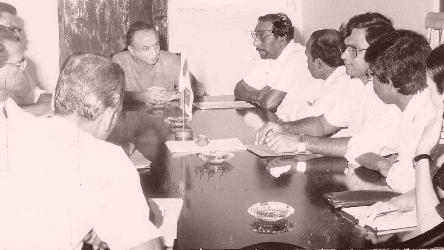


Talking to the LTTE is a hot debating topic for government and opposition political parties. The government maintains the rebel group should be pressurised into talks while some politicians believe initiatives should be set in motion to explore the possibility of a negotiations process.
 Showing
promise initially these meetings have all concluded with no basis for
negotiations.
Showing
promise initially these meetings have all concluded with no basis for
negotiations.
The LTTE has also laid down conditions for talks, chief
among them being that the government troops should withdraw from the recaptured
territory.
However, all major political parties and the LTTE agree the present conflict can only be resolved through a negotiated process. A political solution is a must, parties to the conflict say. But they refuse to meet unless from a position of strength.
Confllict resolution analysts say Sri Lanka can learn a lesson from South Africa.
The conflict resolution climate appears to have stimulated a South African initiative on the Northern Ireland conflict.
Nine political parties from Northern Ireland, who included Unionists, Catholic Nationalist and a delegation from the political wing of the IRA were in South Africa to study how various parties there set aside differences and agreed to a settlement to end apartheid. A conference was held at an undisclosed location to ensure absolute secrecy and both parties were housed in a former missile testing complex. Each briefing was conducted twice in two separate bars and dining rooms. “Those who don’t want to meet will not even have to see each other in the distance,” a Reuters report quoting a South African official said.
The South Africans, who included ANC Chief Negotiator Cyril Ramphosa and Roelf Meyer, insisted the meeting was not intended to be a continuation of Northern Ireland’s own negotiating process, nor was it being arranged so South Africa could attempt mediation. The purpose was simply to inform Northern Ireland politicians on South African’s experience and no particular outcome is expected, they said.
President Nelson Mandela also met the groups separately.
Since 1990 the British Government have been holding secret and formal talks with the IRA leadership, apparently on the premise that the IRA wanted to end the conflict. It is now apparent though that the IRA will do so only on its own terms. An IRA bomb in London in 1996 marked the end of the cease-fire.
In Sri Lanka, too, various initiatives came to a halt as the LTTE repeatedly resorted to violence. Anura Bandaranaike’s initiative to hold secret talks with the Tigers in the jungles off Vavuniya, A.C.S. Hameed’s meeting with Tiger Chief Prabhakaran in 1991, Vijaya Kumaratunga’s visit to the rebel stronghold, Vasudeva Nanayakkara’s peace effort when he too visited the Tiger stronghold have all concluded with no basis for negotiations.
The Government-LTTE talks during early 1995 showed there were differences over a number of issues. The LTTE demanded changes in government policy on certain matters, while the Government was only prepared to consider them as part of a general talks process.
President Kumaratunga in a letter to the LTTE in March 1995 wrote, “All demands could have serious military repercussions if granted outside the framework of an established and durable peace. In the case of all these request, the government has made the maximum concessions without compromising national security’.
In a reply Prabahakaran attributed the reluctance of the government to resolve the urgent and immediate issue to placate the military hierarchy and had pointed out that giving primacy of the strategic interests of the military over and above the concerns of the civilian population would pose a serious threat to the peace process.
In an unpublished manuscript, Clem McCartney , a peace practitioner and theorist from Northern Ireland , says the fact that President Kumaratunga was so clear in making this reference to national security suggests that as far as she was concerned this was an eminently sensible and prudent consideration which would be understood by the LTTE and in subsequent correspondence she continued to justify the government’s stance on the basis that issues have “military repercussions”.
This indicates that while the parties seem to the talking about the same issue, their interest and the way they understand it are different.
McCartney adds if there is one experience to be learnt from the recent Sri Lankan and Northern Ireland experience it is the importance to move through this period as quickly as possible preferably establishing a timetable for formal negotiations.
The Government today claims it is open for negotiations with the LTTE provided the rebel group fulfils certain conditions.
This, however, is not the case with regard to Deputy M. L. M. Hisbullah, who seems to have a good rapport with the LTTE.
Mr. Hisbullah has initiated a channel of negotiations with the Tigers and has been successful in ensuring uninterrupted telecommunication service in Batticaloa and a power supply line to Paduvankarai.
With or without a green- light from the government, Mr. Hisbullah is using his clout with the LTTE to push through projects in the east. Muslims in the east early this year held talks with the LTTE facilitated by the ICRC. At the time members from the Muslim community including an opposition MP said the community had little faith in government troops and so thought it prudent to approach the LTTE alone.
In Parliament last week A.C.S. Hameed criticised the government’s present military offensive in the north stating that “they may win the battle but lose the war.” Mr. Hameed added the present military objective is to defeat the LTTE so that the Government could then go to the polls and get a 2/3rd majority. This whole military offensive will only serve to create permanent wounds in the hearts of the Tamil people, he said.
Go to Rajpal Abeynayake's Column
Return to the Editorial/Opinion contents page
